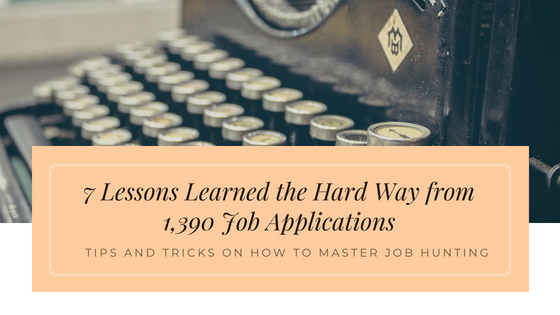
The more refined your job hunting and cover letter writing skills, and the better you understand how to navigate the job application process, the higher your chances are at landing that first job and many more.
So whether your job application is rejected or accepted, treat each and every application as a learning experience. Stressful and soul-wrenching as the process may be, dive full speed with an open mind so you can make your chance of landing a gig today higher than it was yesterday.
Some time back as I was going through my oDesk profile, now Upwork, I realized that as at the time, I had sent a total of 1,390 job applications over my 3 years as a part-time freelancer on the platform.
Of these, only 66 translated into a hire. That’s about 4.7% response rate. Wow!
I spent time flipping through the applications and one thing was obvious.
The latest, more current applications were definitely more refined than the former ones I sent out during my days as a newbie. I had clearly improved with time.
Following are seven lessons that I learned over the years about applying for and eventually getting hired for jobs :
What's Covered in This Article
1. Don’t be put off by employer requirements
In the bid to limit the number of applications to a manageable level, it is not uncommon for job posters to put prior qualification requirements for potential applicants.
For instance, employers would use pre-qualifications such as years of experience, number of Upwork hours, feedback score, geographic location, etc.
Though some of the job posters are very strict with their requirements, majority would still consider an applicant if they lacked one or two of the qualifications but were in possession of other skills essential in performing the job.
It does no harm to still send your application if you are sure that the pre-qualifications would in no way deter your ability to deliver on the assignment.
For example, recently I responded to a job application which categorically stipulated that they were only seeking for business plan advisers (writers) from North America.
Since I knew that I possess the necessary skill and experience necessary to undertake such an assignment, I saw no harm in giving it a try.
I expressly mentioned that “while I understood that the employer preferred freelancers from North America, I am fluent in the English language and that I have often received compliments that my English reads like that of a native…”
The employer was kind enough to respond to my application. In her response, the general reason of preference for advisers in those locations – besides the native language – is that they require advisers to have a US phone number where clients can contact them.
She further went on to explain that having it through a VoIP system (like Skype) was fine, as they simply want to make it as easy as possible for clients to contact their advisers.
But, the best part of her response was: “would this be something you could do?”
That is getting a US phone number through a VOIP system.
See?
Had I gotten bogged by her pre-qualification, I’d have missed this great opportunity.
By the way, I said yes!
2. Don’t give up too soon
It is no easy task sifting through the tonnes of application.
After sending in your application, hang in there.
A day may turn into a week.
A week may turn into a month.
Unless the employer has already hired someone else, don’t be too quick to withdraw your application.
This is especially so for employers that are already Upwork verified and have a track record of hiring.
I have seen employers that registered on Upwork 3 years ago, have 20 job openings pending, but have never hired even a single freelancer.
You may want to be weary of such especially if you don’t hear from them in a week or two.
As various freelancing platforms limits each freelancer’s job application quota depending on various factors, you need to strike the right balance between waiting and waiting for too long.
3. Don’t brush aside a short-term position
A short-term position can very easily turn into a full-time gig especially if you deliver and make yourself irreplaceable.
If there are no possibilities of extending the engagement, the employer may recommend you to their friends especially if you did a great job.
A lot of Upwork employers ask for at least one hour of Upwork experience.
4. Still be nice to those employers who decline your application
Rejections are never easy to handle, whether they be job related or relationship related.
Even if the employer rejects your application after making you go through a series of grueling interviews, be nice to them.
Pretend to have enjoyed the experience and thank them for having considered you as a potential candidate. They probably may change their mind and hire you should another position arise.
5. Don’t be afraid to work for free (sometimes)
We all know the famous quote “freelancer doesn’t mean work for free” and I am one of its advocate. However, sometimes it is the only way to land a long-term well-paying freelancing job.
An example is jobs by GTeam FZ LLC who happens to be one of the largest and well-paying employers on Upwork. To get hired for any of their positions, one needs to do an online skills test (they’re quite long by the way), a Skype interview, before being hired on a one-week fixed-price trial assignment (Sorry, we still haven’t reached the payment part).
All this they do to give candidates a chance to prove that they can handle the full-time position of 40 hours/week. Such jobs therefore are definitely worth working at for free.
GTeam FZ LLC for instance clearly indicates in their job applications that even if you don’t get a stellar performance on the test phase of a given job, and yet you have the necessary motivation, they could hire you for other open positions.
6. Don’t just accept “any gig”
Just because the job poster invited you for interview doesn’t mean you must take the offer.
That is why Upwork has 3 options to choose from: “yes, accept interview”; “decline”; and “ignore”.
Every assignment is unique, and if you can hold off on accepting a job offer outside of your sphere of expertise and experience, you should.
It’s harder than you think to not deliver than it is to decline the offer for a job you are not qualified for and therefore lack the necessary skill to tackle.
7. Negotiate your pay well
Not doing so will only come back to haunt you.
As a freelancer working on an online marketplace such as Upwork that has open access (if your profile is public) to your payment details per job undertaken, any under-payment for a given task can only work against you.
If you have constantly been charging ridiculously low fees for your services, its bound to be quite a challenge negotiating higher pay with future clients. It is therefore paramount that you negotiate fair pay commensurate with your expertise, type of work and prevailing market rates.
And this must start from the very beginning of your freelancing career.
Remember, “you don’t get paid what you’re worth, you get paid what you negotiate for”.
Are you on Pinterest? Pin this for Later!





